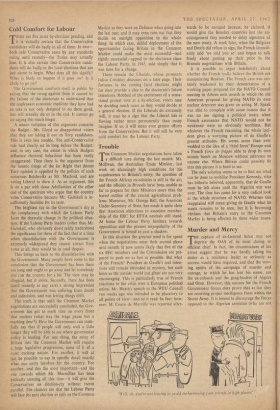Trouble
THE Common Market negotiations have taken a difficult turn during the last month. Mr. McEwan, the Australian Trade Minister, last week set alarmingly high conditions for his acquiescence to Britain's entry; the question of the French African ex-colonies is still in the air; and the officials in Brussels have been unable so far to prepare for their Ministers more than the barest outline of the crucial agricultural prob- lems. Moreover, Mr. George Ball, the American Under-Secretary of State, has made it quite clear that American objections to associate member- ship of the EEC for EFTA neutrals still stand. At home the Labour Party lumbers towards opposition and the present unpopularity of the Government is bound to cast a shadow.
In this situation the greatest need is for speed when the negotiations enter their second phase next month. It now seems likely that five of the six EEC members and the Commission are pre- pared to push on as fast as possible. But what of the French?' President de Gaulle's real inten- tions still remain shrOuded in mystery, but such hints as the outside world can glean are not very encouraging. This is particularly true of French reactions to-the crisis over a European political union. Mr. Heath's speech to the WEU Council two weeks ago was intended to be placatory to all points of view—and so it read. In fact, how- ever, M. Couve de Murville was reported after-
sir, you're not leaving to avoid embarrassing your friends in high places.'
wards to be enraged because, he claimed, it would give the Benelux countries just the en- couragement they needed to delay signature of the new treaty. A week later, when the Belgians and Dutch did refuse to sign, the French immedi- ately said 'we told you so' and began to talk freely about putting up their price in the Brussels negotiations with Britain. It is possible to argue indefinitely about whether the French really believe the British are manipulating Benelux. The French case was cer- tainly weakened by their denunciation of a working paper prepared for the NATO Council meeting in Athens next month in which the old American proposal for giving NATO its own nuclear deterrent was given an airing. M. Spaak was able to complain with some reason that it was no use signing a political treaty when French assurances that NATO would not be weakened were so obviously worthless. But whatever the French reasoning, the whole inci- dent gives a worrying picture of de Gaulle's present attitudes. He seems more than ever wedded to the idea of a 'third force' Europe and a French force de frappe able to drop its own atomic bomb on Moscow without reference to anyone else. Where Britain could possibly fit into this picture it is hard to see.
The only solution seems to be to find out what can be done to mobilise President Kennedy, who has hitherto believed, apparently, that de Gaulle must be left alone until the Algerian war was over. The time has come for a very radical look at the whole structure of NATO. Whether this reappraisal will mean giving de Gaulle what he wants remains to be seen, but it is becoming obvious that Britain's entry to the Common Market is being affected by these wider issues.














































 Previous page
Previous page